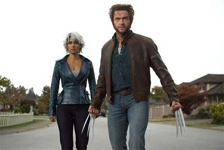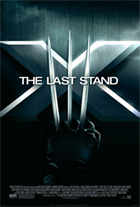X-Men: The Last Stand
|  I have a theory--probably not a very good one, but a theory nonetheless--as to why many critics and viewers have so much trouble taking director Brett Ratner seriously. It’s his name. I have a theory--probably not a very good one, but a theory nonetheless--as to why many critics and viewers have so much trouble taking director Brett Ratner seriously. It’s his name.Think about the great director-icons of the cinema, and they invariably have impressive-sounding names that invite feelings of awe. There are the obvious foreign directors such as Ingmar Bergman, Michelangelo Antonioni, and Roman Polanski, whose names literally drip with art and importance. And of course there’s the incomparable Alfred Hitchcock, whose name so perfect summarizes his blend of classicism and the macabre--the first name suggesting every upper-class British cliché imaginable, which contrasts with the harshness of his last name, ending as it does with a vulgarity. But one doesn’t have to go abroad to find strong director names. The great American filmmakers--John Ford, Howard Hawks, Orson Welles--all ring with strength and conviction. They look great on paper and even better as credits on-screen. Brett Ratner, on the other hand, sounds like the punk kid who sat behind you in algebra. The credit “A Brett Ratner Film” sounds like it should precede an eighth-grade English project shot on a Handicam. Despite his less-than-stellar moniker, Ratner is not nearly as bad a director as he’s often made out to be, although he has made some very lousy movies (Rush Hour 2 is the very definition of coasting on a previous success). Ratner’s general reputation is so bad, however, that the second it was announced that he would be helming the third installment of the successful X-Men movie franchise, taking the reigns from Bryan Singer, who directed the first two installments but left to direct the upcoming Superman Returns, the Internet was rife with grips and complaints that he was going to ruin it. In fact, Ratner has not only not ruined X-Men: The Last Stand, but he has made one of the best films in the series (while not as good as 2003’s X2, it is several notches above Singer’s original X-Men). The film has its weaknesses, to be sure--there are some holes in the plot and, at a brisk 104 minutes, it feels too rushed in places, as if Ratner didn’t trust his audience to invest too much time. Yet, the story works well, particularly because Ratner rachets up the intensity. He gives the comic-book franchise a heightened aura, taking some scenes to melodramatic and virtually operatic highs that suggest he was willing to do more than just “not screw it up.” The story continues from where the first two films left off. It takes place primarily in a near-distant future where a group of people known as “mutants,” whose X-gene gives them special powers (and sometimes special appearances), are struggling to be accepted in a society that fears them (unfortunately, the one aspect of the franchise that Ratner lets drops is the socio-political dimension, which is given fairly short shrift). The tensions between humans and mutants is intensified when a corporation headed by billionaire Warren Worthington II (Michael Murphy) announces that it has found a “cure,” a drug that will eliminate the X-gene and make mutants “normal.” The cure’s most staunch opponent is Magneto (Ian McKellan), the series’ ostensible villain. However, Magneto is the most intriguing of villains because his villainy has rational and defensible claims. He realizes that humans will never accept mutants and has thus resorted to violence as a means of protecting himself and those like him. The opposite approach has been taken by Professor Charles Xavier (Patrick Stewart), who founded a school for wayward mutants in an attempt to guide them into more peaceable solutions to both their personal predicaments and their relationships with the human race. Most of X-Men: The Last Stand revolves around the mutant community’s response to the cure, which not surprisingly leads to something close to all-out war. Magneto begins amassing an army hellbent on destroying the drug and those who produce it, while Xavier’s group, led by the gruff Wolverine (Hugh Jackman) and the increasingly maternal Storm (Halle Barry) try to work with the government, which now has a mutant representative in Dr. Hank McCoy, aka “Beast” (Kelsey Grammar, giving an effective performance beneath pounds of latex, blue make-up, and hair). A separate subplot involves the metamorphosis of Dr. Jean Grey (Famke Janssen), Xavier’s second and possibly the most powerful mutant in the world. When X2 concluded, it appeared that Jean had sacrificed herself for her friends, but if there’s one thing comic books and comic-book movies have taught us, it’s that no one stays dead for long. Yet, when she is resurrected, Jean does not appear to be the same character, and we soon learn that Professor Xavier had taught her as a girl to compartmentalize her anger, which led to the flourishing of an entirely different personality known as Phoenix. There are other new mutants as well, including the angry Juggernaut (Vinnie Jones) and the cure producer’s son (Ben Foster) who sprouts enormous feathered wings from his back (in the film’s most affecting and wrenching moment, we see him as a child attempting to cut his budding wings off with knives). The inherent tension between being different and wanting to belong remains a strong undercurrent in X-Men: The Final Stand, which gives it a strong continuity with the previous films. The metaphorical implications of the storyline remain surprisingly robust even though you have to read into them more (Singer made the implications much more clear, never so strongly as in a touching “coming out” scene in X2). Ratner clearly spent most of his time and energy on the film’s action sequences, which are bigger and bolder, though not necessarily better, than those in X2. Everything is loud and bombastic, which doesn’t leave room for more nuanced action, such as Magneto’s clever prison break in the second film. There is a fantastic escape sequence on a mountain highway involving flipping trucks, and the film ends with a fiery battle between Magneto’s mutants and the U.S. military at Alcatraz Island, which Magneto approaches by ripping apart that Golden Gate Bridge and moving it (his special power is that he can control metal). All the sound and fury of the violence is appropriately high-pitched in a summer movie season packed with such spectacle, but when X-Men: The Final Stand works, it is primarily because it doesn’t lose sight of the emotions that fuel the fire. Copyright ©2006 James Kendrick Thoughts? E-mail James Kendrick All images copyright ©2006 20th Century Fox |
Overall Rating: 

 (3)
(3)


